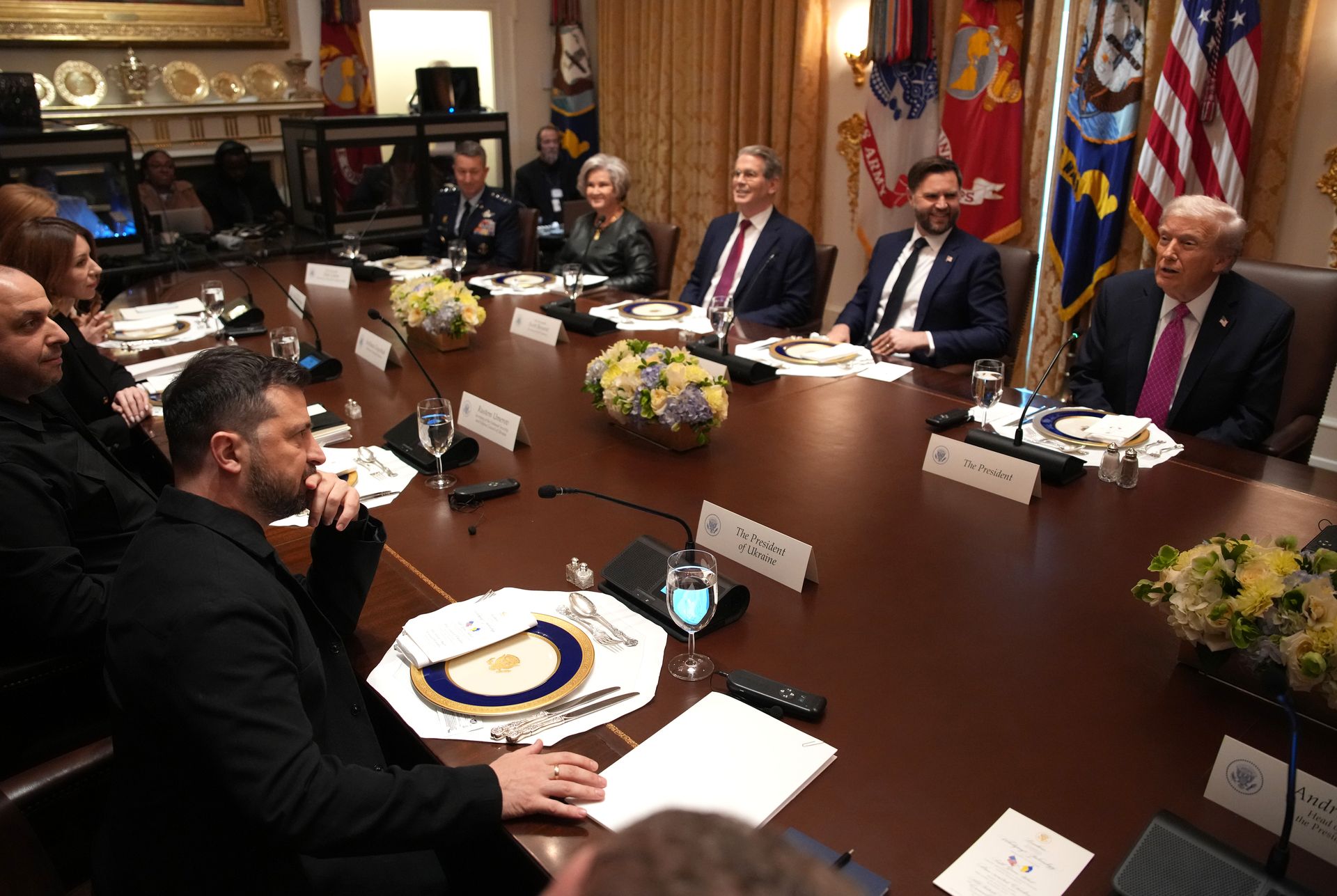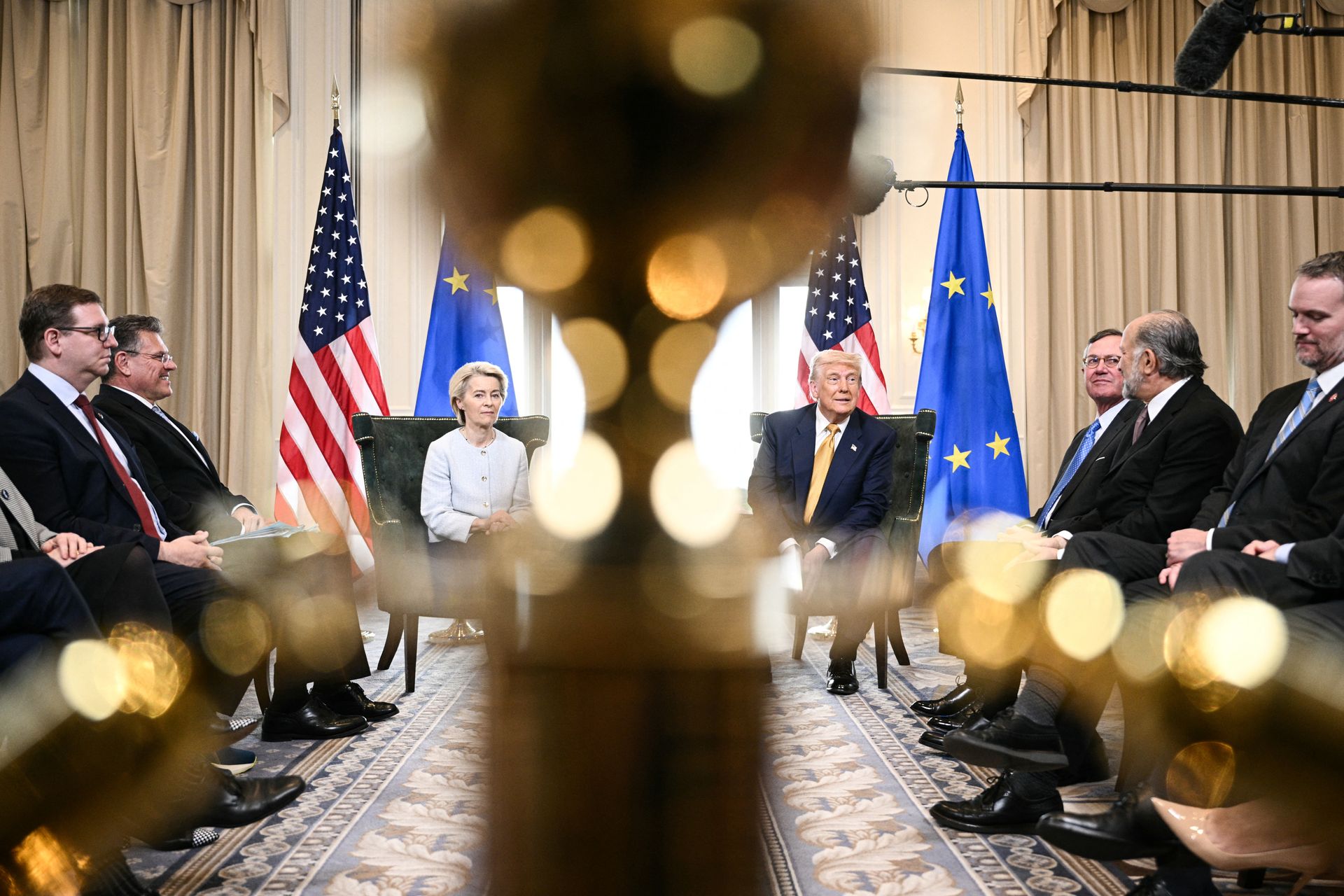As Zelensky set to land in Brussels, EU rushes to offset Trump's pressure on Ukraine
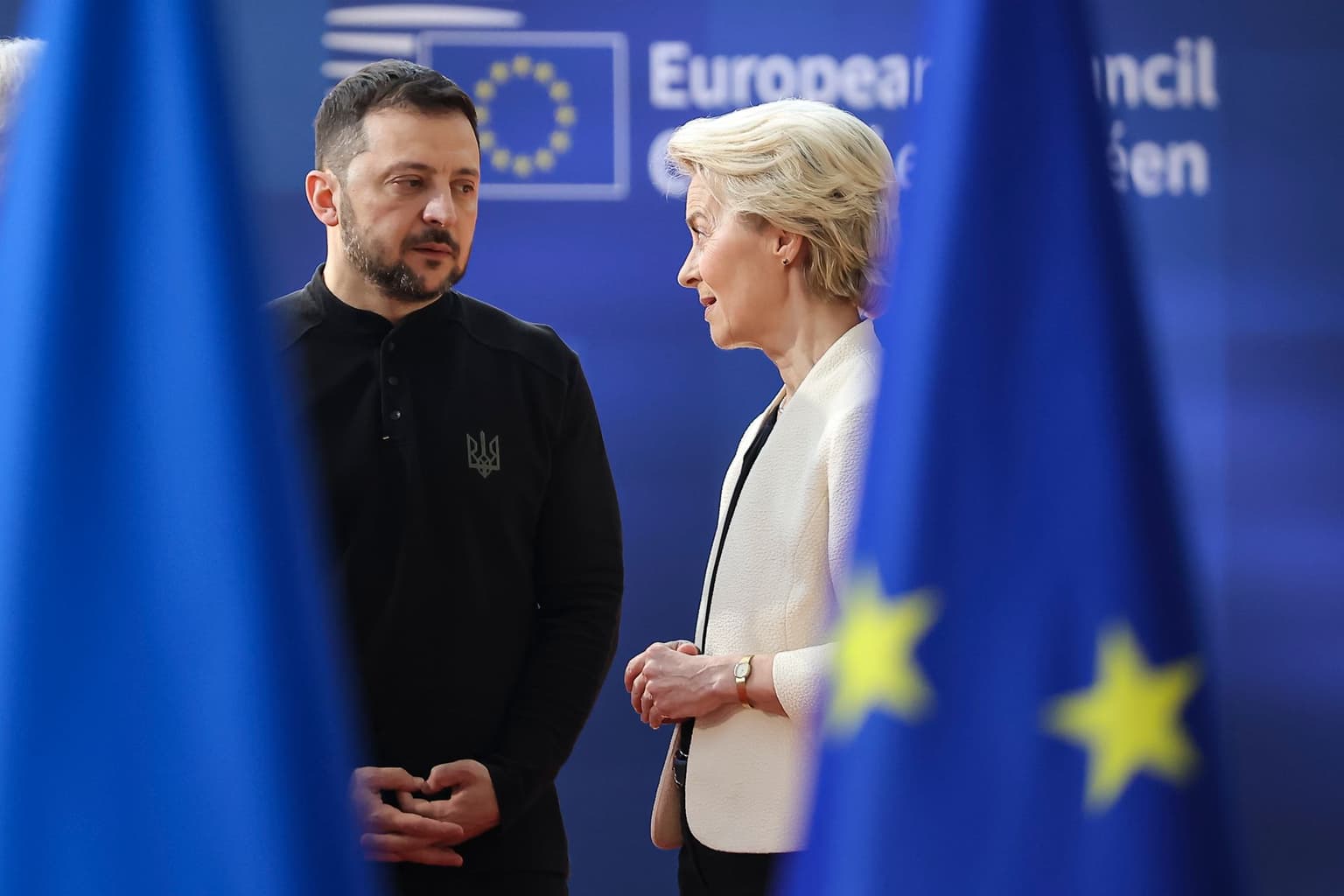
President Volodymyr Zelensky alongside European Commission President Ursula von der Leyen in Brussels, Belgium, on March 6, 2025. (Nicolas Economou / NurPhoto via Getty Images)
BRUSSELS, Belgium — On short notice, the upcoming EU Council meeting is set to become a scramble to contain and counter U.S. President Donald Trump's renewed pressure on Ukraine.
Since the start of the week, European diplomats have been searching for a coordinated response to Trump's revived messaging that echoes Vladimir Putin's demand for Ukraine to capitulate and hand over territory in Donbas, eastern Ukraine.
EU leaders, meeting in Brussels on Oct. 23, are expected to weigh in on a wide range of measures in support of Ukraine — including whether to unlock frozen Russian Central Bank assets for Kyiv.
At Thursday's in-person summit with President Volodymyr Zelensky, EU leaders hope to finally agree on a unified approach.
A 12-point plan for Trump
An elusive Trump-Putin summit in Budapest — for now apparently shelved — has deeply alarmed European capitals: not only would Putin, who is wanted under an international arrest warrant, be meeting on EU soil, but the talks would exclude both Zelensky and the EU.
European officials had already been outraged by Trump's warm reception of Putin in Alaska in mid-August. Concerns were somewhat eased by the subsequent meeting between Trump and Zelensky and several European leaders in Washington, after which he seemed to distance himself from Putin. That is, until the two leaders — Trump and Putin — spoke again by phone last week.
Asked about the constantly shifting signals, one EU diplomat said it felt like "starting from zero again."
"Failure to prevent the (Trump-Putin) meeting from taking place on EU soil will expose both the EU's unwillingness to confront Trump and its years-long failure to discipline Orban's Hungary for its pro-Kremlin alignment," Marta Prochwicz, policy fellow at the European Council of Foreign Relations (ECFR) said.
She added that there should be a broader realisation that even a frozen front line would mean Putin "will regroup and reattack," requiring long-term and structured EU backing: security assistance, closer EU integration, and strengthened Ukrainian internal resilience.
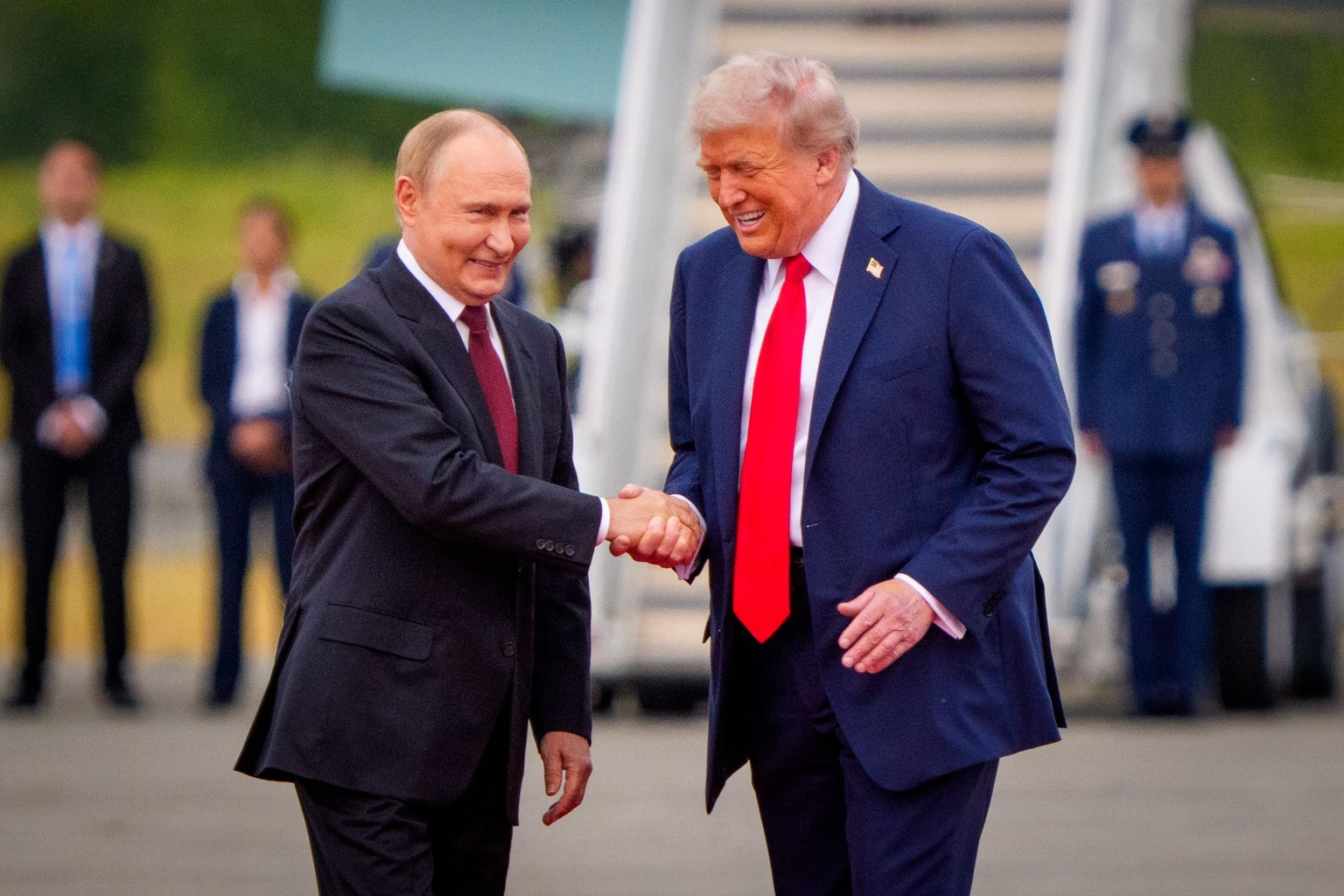
To anchor existing commitments and stave off pressure for concessions, European officials are working with Kyiv on a 12-point "bottom lines" plan — first reported by Bloomberg — that would lock in terms based on the current contact line rather than territorial surrender.
The proposal, which is still in early stages, would largely incorporate already existing support provided to Ukraine. This would include a ceasefire, security guarantees, the return of abducted Ukrainian children, a phased easing of sanctions tied to compliance on the ground, and keeping Russian assets frozen until Moscow pays reparations.
A key purpose would be to push back against Putin's renewed demands to Washington for Kyiv to surrender unoccupied territory in return for a peace agreement, and instead lock down the current contact line as the starting point of negotiations, according to several EU diplomats.
It follows a Washington+ statement by Kyiv and its European partners earlier this week, which aimed to capture precisely that point that Trump had already verbalised.
The strategy mirrors the recent Gaza multi-step framework, with the idea of offering Trump a role as chair of an international peace board to secure his buy-in, according to people familiar with the talks.
Further thinking on the European side is that such a proposal would involve a similar multiple-step plan, like the recent Gaza peace deal, to show to Trump and secure his buy-in for European positions, also by making him the chair of a peace board that would then oversee implementation, people familiar with the talks said.
Zelensky will brief EU leaders on his talks with Trump on Oct. 24 before flying to London for a back-to-back "Coalition of the Willing" meeting to hammer out further details.
Frozen assets, cautious steps
At the center of the EU summit, however, will be whether member states grant the mandate for the European Commission to present a concrete legal proposal for a 140-billion-euro reparations loan to Kyiv, based on the Russian frozen assets.
The bloc is proceeding with extreme caution as the majority of countries remain wary that outright seizure could expose them to major legal liabilities if challenged in international arbitration.
The European Commission last week had submitted further clarifications to the member states intended to address and dispel Belgium's reservations, where a total of 185 billion euros is parked as the Russian Central Bank assets in the financial clearing house Euroclear.
Ahead of Oct. 23 talks, Belgium maintains most of its concerns about the risks it could face, though the Belgian government is said to have agreed to let the Commission move forward with presenting the legal analysis.
A bottom line for most EU member states is that they must collectively bear the risk should an international arbitration court declare the reparations loan unlawful.
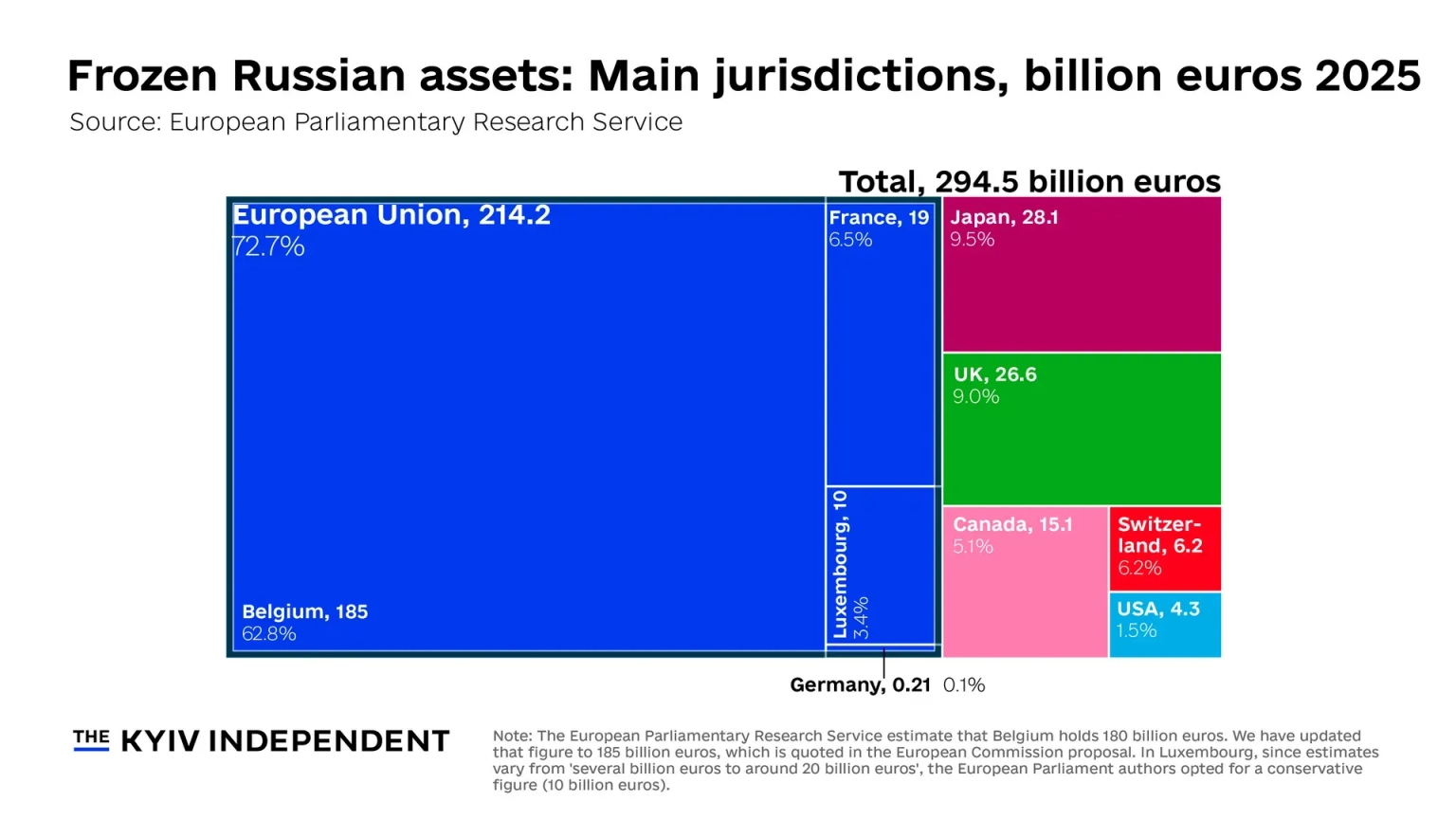
For that, national guarantees for the loan amount are required, but most capitals are hesitant to agree before they have seen further legal analysis from the Commission to dispel their concerns.
According to draft summit conclusions obtained by the Kyiv Independent, leaders will "call on the Commission to present as soon as possible, based on an assessment of Ukraine's financing needs, concrete proposals involving the possible gradual use of the cash balances associated with the immobilised Russian assets, in accordance with EU and international law," backed by "appropriate EU solidarity and risk-sharing."
Officials hope the legal proposal can be finalized by November, with a political deal possible at the December summit.
Thursday's bigger discussion, however, will be a looming dispute over whether Ukraine must use the obtained money primarily to buy weapons in Europe and Ukraine or whether it should have a free hand to shop for American gear in accordance with operational needs.
Sanctions unblocked
EU leaders are also expected to welcome the EU's 19th sanctions package on Russia, after Austria and the latest holdout, Slovakia, lifted their objections, according to a statement by the Danish rotating presidency of the EU.
A few hours earlier, Slovak Prime Minister Robert Fico told parliament that Bratislava withdrew its veto after securing a commitment to accelerate EU work on lowering energy prices across the bloc.
Fico insisted his aim was never to block sanction measures outright — only to ensure that "the EU's agenda is not Ukraine, Ukraine, and nothing but Ukraine, while Europe's economic problems are ignored."
The EU’s latest round will include a ban on Russian liquefied natural gas imports — where short-term contracts will end after six months and long-term contracts from January 1, 2027 — as well as new travel restrictions on Russian diplomats and 117 more vessels from Moscow's shadow fleet.

